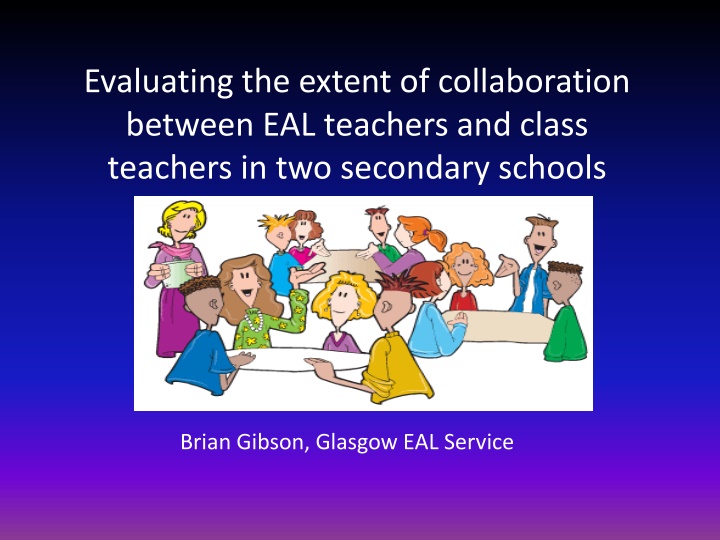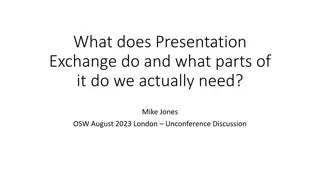
Evaluating Collaboration Between EAL and Class Teachers in Secondary Schools
Explore the extent of collaboration between EAL teachers and class teachers in secondary schools, focusing on enhancing learning and influencing practices. The study encompasses professional inquiry, practitioner research, and collaboration policy context within the educational landscape of Glasgow. Various methodologies and themes, such as pedagogical theories, research engagement, and building sustainable teacher practices, are discussed.
Download Presentation

Please find below an Image/Link to download the presentation.
The content on the website is provided AS IS for your information and personal use only. It may not be sold, licensed, or shared on other websites without obtaining consent from the author. If you encounter any issues during the download, it is possible that the publisher has removed the file from their server.
You are allowed to download the files provided on this website for personal or commercial use, subject to the condition that they are used lawfully. All files are the property of their respective owners.
The content on the website is provided AS IS for your information and personal use only. It may not be sold, licensed, or shared on other websites without obtaining consent from the author.
E N D
Presentation Transcript
Evaluating the extent of collaboration between EAL teachers and class teachers in two secondary schools Brian Gibson, Glasgow EAL Service
Professional Enquiry Empowers teachers by increasing knowledge of learning strategies Encourages teachers to challenge and change aspects of individual and collective practice within schools Potential for significant positive impact on individual and institutional practice pupils learning Limitations on generalizability of knowledge generated (although some learning can transfer to similar situations across education system)
Practitioner Enquiry within the GTCS Standards The Standard for Full Registration expects the following: 2.3 Pedagogical Theories and Practice 2.3.2 I have knowledge and understanding of the importance of research and engagement in professional enquiry Professional Reflection and Communication 3.4.1 I read and critically engage with professional literature, educational research and policy 3.4 Enquiry and Research within the Standard for Career-Long Professional Learning includes : 2.2 Professional Skills and Abilities 3.3 Enquiry and Research The Standards for Leadership and Management reflects this expectation in: 3.2 Develop coherent approaches to professional learning which build and sustain teachers practice 4.2 Develop staff capability, capacity and leadership to support the culture and practice of learning
M Ed Professional Enquiry Two secondary schools within Glasgow Dual case study approach, qualitative methodology: focus groups, 1-1 interviews, discussion of data with Critical Friends Methodology: scaled- down version of Grounded Theory Tensions in maintaining critical distance participants views ethics; limits of research Focus on three issues: the extent of collaboration between EAL and class teachers exploring ways EAL teachers can influence learning identifying ways collaboration could be enhanced from the class teacher s perspective.
Collaboration Policy context promoting collaboration between agencies Human Rights, ASN, GIRFEC, EAL policies Education as a results business with subject silos Groupthink limiting horizons EAL marginalized pupils and marginalized teachers? Building understanding of cases from ground up A scale of collaboration- jagged profiles Collegiality ----- cooperation ----- collaboration Is collaboration always best? Creative dissent Private sector models: Kaizen, lean working , doing more with less , management offloading responsibility for crisis- management Methodology: interviewing frontline staff appropriate for THIS enquiry
Findings 1. Communication and planning Lack of planning time for liaison between EAL and mainstream teachers and the potential for negative impact on the working relationship between EAL and mainstream teachers Collaboration tending to occur in pockets between teachers who share affinities, not systematic or widespread, akin to collegiality Micro-management by formal leaders; staff cliques intent on blocking changes they perceive as working against their own short-term interests. Shared Responsibility for classroom environment as a way forward implies not only time for planning and discussion of learning outcomes and strategies, but also understanding of pupils needs - beyond a few EAL pupils and the credibility to be able to act effectively across the board on these issues
Findings 2. Support Strategies The EAL teacher can lessen the vulnerability of bilingual pupils but then becomes indispensable, which creates dependency instead of empowering wider layers of staff. Relative lack of reach of training on EAL issues within both schools amongst class teachers. Lack of management support tends to relegate collaboration to the individual level, or lead to scenarios where EAL teachers work around difficult staff members and cliques Successful collaboration between content and ESL teachers characterised by fluent two-way dialogue and joint engineering of the classroom environment to better support pupils needs, even within top-down, exam-driven national education systems
Findings 3. School Structures and Policies Franson (1999) lack of communication, ad hoc responses with little theoretical insight or chance to share and review with colleagues, ultimately leading to individual classroom teachers struggling with next-to-no support to invent fixes for newly arrived migrant pupils in their classes. You can see the struggle against hierarchy and staff cliques for a more pupil-centred, collaborative approach; the search for allies to support individuals and groups of pupils and also in small-scale literacy initiatives that have been successful. Neither mainstream nor EAL staff possess much autonomy in decision-making within the current managerial structures and policy climate, rather than it being the case that EAL teachers are excluded from a decision-making role in the classroom per se.
Findings 4. Additionality By focussing support across ability groups or sets , where we can integrate content and language resources and strategies, the influence that EAL teachers can have on learning could also be enhanced Absolute equality amongst participants is not a pre- requisite of successful collaboration; what is indispensable is a recognition of the discrete skills and knowledge that partners bring to the project and how best to use them. Micro-level gains in collective performance can build into more substantial improvements within schools over time, with support from SMTs and progressive buy-in from class teachers as they see the benefits of participation.
Findings 5. Professional Learning Mainstream colleagues felt that collaborative assessments would be more supportive of the identification of pupil needs and placement within appropriate learning pathways. CPD- needs wider layers of staff buying in. If you get to critical mass you change big things in a school. Colleagues therefore face a major challenge when faced with EAL pupils who may have zero or very weak literacy in their home languages. There is no quick fix for this.
One Class Teachers Experience How do we know when EAL support is needed? What forms does this support (mainly) take? What could make it work better? In the current (budgetary/ workload) climate can we talk about more time to communicate and plan? What are the realistic next steps in collaboration?
Implications for Practice School structures that support collaboration Planning and communication tools Top down and bottom up leadership Training on EAL strategies Models of collaborative working Collegiality ---- Cooperation ---- Collaboration Synergy aka the whole is greater than the sum of the parts ; second loop learning ; sharing expertise Creative dissent but not groupthink Ways forward for Professional Enquiry (GTCS)
GTCS Supports to Share Practitioner Enquiry To access the Education HUB you have to login to MyGTCS Education HUB EducationHUB is an interactive online platform that provides an opportunity for education practitioners to share, discuss and review unpublished practitioner produced research and enquiry. Research network If you have used an article from Education Source -EBSCO, write a brief summary to share your learning on the GTCS website. Thought piece Write a short article to share your findings or thoughts on a particular issue. Pedagoo link colleagues can submit a blog post of their enquiry to pedagoo http://www.pedagoo.org/ Acknowledgement: I would like to thank the General Teaching Council Scotland (GTCS) for the information on this slide and on slide three. Brian Gibson






















